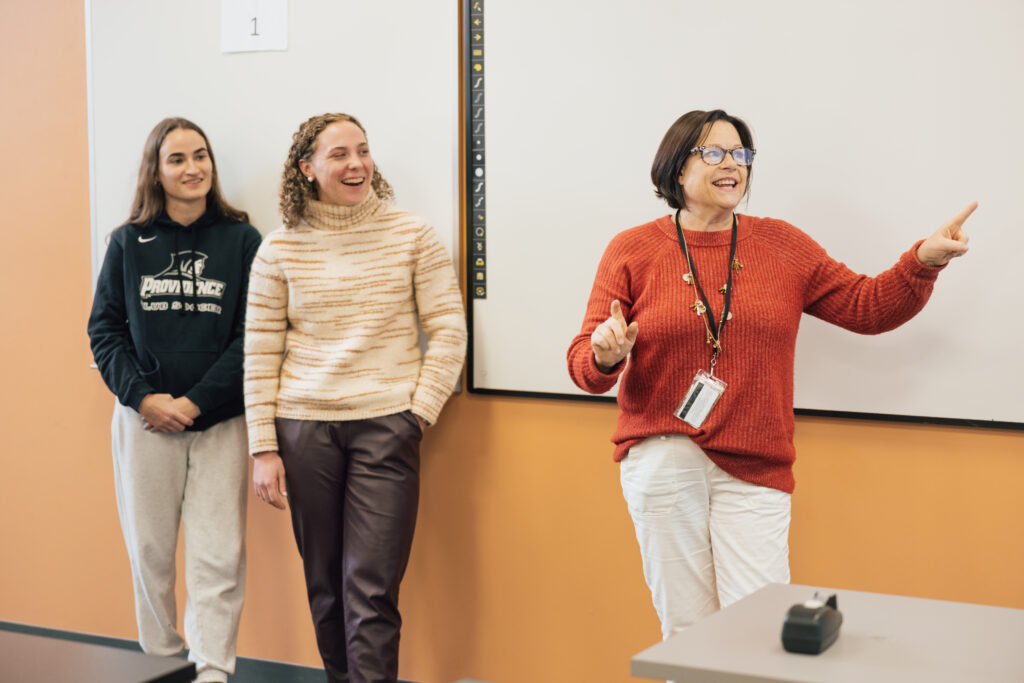Teacher Certification and M.Ed. in Mathematics
Share your love of math with middle and high school students
Providence College’s Teacher Certification Program (TCP) and Master of Education in Mathematics offer a unique pathway to teach students in grades 7 to 12 and develop advanced math skills. Approved by the Rhode Island Department of Education, your certification can also be used (through reciprocity) to achieve certification/licensure in at least 45 other U.S. States.

This TCP/M.Ed. combination is designed for working adults. Its six teaching courses and five graduate mathematics courses may be fulfilled on a part-time basis. Following this, all students must complete a full-time, 12-week classroom experience as the final requirement. Those interested must have completed a bachelor’s degree or the equivalent (30+ credits) in mathematics to be eligible for this program.
Other highlights of the TCP/M.Ed. in Mathematics include:
- Instruction provided by current and former teachers, principals and superintendents
- Courses offered year-round in the evenings (online and on campus)
- 60 hours of field experience gained during the pursuit of regular coursework
- Small classes with other motivated adult learners
- Surprisingly affordable tuition that’s comparable to state schools
Upon completion, students will be competent in integrating Rhode Island Professional Teaching Standards within their teaching practice. They’ll also be eligible for certification upon successful completion of student teaching and passing scores for both the Principles of Learning and Teaching (PLT) Praxis test for grades 7-12 and the Praxis Mathematics content area test.
By the Numbers
45
states in which this credential may be used to achieve certification/licensure
27
credits focused on teaching standards and field experience
15
graduate credits focused on culturally competent teaching practices
Mathematics Coursework
Our curriculum addresses the biggest challenges in today’s high school classroom. You’ll learn about classroom management, cultural competency, project-based learning, working with students who are English learners, and other best practices, while also developing your high-level mathematics skills. The curriculum is tailored around the knowledge you already have and what you’ll need to be an effective teacher.
EDU 791: Educational Psychology (3 credits)
Study of those facts and principles of psychology that will assist the students in formulating and clarifying objectives as classroom teachers. Deals with such matters as cognitive development, motivation, retention, problem solving, and the social and emotional problems involved in personality integration.
EDU 792: Principles of Secondary Education (3 credits)
This initial secondary education course introduces the concepts and practices of teaching. Students will learn to develop lesson and unit plans, practice teaching techniques and explore the roles of classroom management.
EDU 786: The Exceptional Child in the Regular Classroom (3 credits)
Designed to provide prospective teachers with the skills, knowledge, and attitudes required to identify students with special needs and to work with support staff in meeting the students’ needs within the general curriculum. Focuses on understanding the characteristics of these students and on developing sensitivity to their needs within a least restrictive environment.
EDU 785: Educational Measurement (3 credits)
Designed to introduce students to the theory and practice of measurement including the construction, application, and interpretation of standardized and teacher-made tests used to inform teaching and curriculum decision making. Students will also examine alternative assessments including authentic and portfolio assessments.
EDU 622: Reading in the Content Area (3 credits)
Course investigates the use of specific strategies to incorporate into the teaching of content subjects. Research relating to reading skills taught in content areas is reviewed. Texts and research material address content in grades 5 through 12. Cooperative learning model is utilized in course. Model and exemplary programs in use in local school districts are examined.
EDU 787: Methods in Secondary Education (3 credits)
Course provides the student with the opportunity to develop skills in the teaching process. Emphasis is on the practical aspects of the teaching methodology. Attention is given to individual needs in the content area. Students will register for the English/Social Studies or Math/Science section.
EDU 455: Student Teaching (9 credits)
Student teaching is a full-time, 12-week experience in classroom in grades 7-12, which is often completed in one of our partner schools. It is the final requirement in the Teacher Certification Program. The Clinical Educator (host teacher) and a Providence College faculty member provide supervision and feedback throughout the experience. Weekly seminars are conducted by the faculty member, as well.






